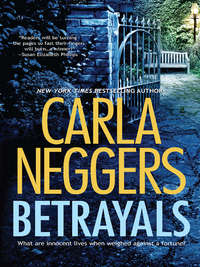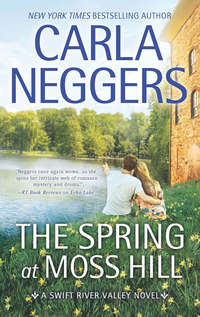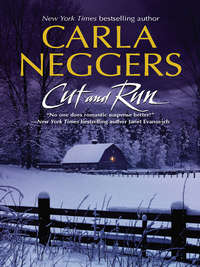
Полная версия
Cold Ridge
Then came graduation, the PJ’s distinctive maroon beret, assignment to a team—then Ty thought, the real training began.
PJs had been called SEALs with stethoscopes, ninja brain surgeons, superman paramedics—if people knew what they did at all, since so many of their missions had to be done quietly. It wasn’t a job for someone looking for money and glory. Ty cringed at all the nicknames. He thought of himself as an average guy who did a job he was trained to do to the best of his ability. He’d become a PJ because he wanted an action-oriented career where he could save lives, a chance to “search and rescue” instead of “search and destroy.”
But he could “destroy” if he had to. PJs were direct combatants, and, as such, pararescue was a career field that remained closed to women.
Ty was currently assigned to the 16th Special Operations Wing out of Hurlburt Field in the Florida panhandle. As the leader of a special tactics team, he had performed a full range of combat search-and-rescue missions in recent years, but it was seeing Carine Winter under fire last fall that had all but done him in.
The “incident” was still under investigation.
The only positive outcome of the whole mess was that Hank Callahan and Antonia Winter had met and fallen in love. Ty had missed their wedding a month ago. Antonia was too damn polite not to invite him. His behavior toward her younger sister had put a crimp in the budding romance between his friend the ER doctor and his friend the helicopter-pilot-turned-senate-candidate—fortunately, they’d worked it out.
Senator Hank Callahan.
Ty shook his head, grinning to himself. He and Hank had damn near become brothers-in-law. They would have, if Ty had gone ahead and married Carine in February. Instead, he’d cut and run.
It was the only time in his life he’d ever cut and run.
“Have you decided whether or not you’re selling the house?” Gus asked him.
Ty pulled himself from his darkening thoughts. “No. I haven’t decided, I mean.”
He’d been on assignment overseas when his mother took a walk in the meadow and died of a massive stroke. Carine had found her and tracked him down to make sure he got the news, to tell him his mother had painted that morning and died in the lupine she’d so loved. But Saskia North had never really fit in with the locals, and few in Cold Ridge knew much about her, beyond her skills as a painter and a weaver—and her failings as a mother.
“You should sell it,” Gus said. “There’s nothing for you here, not anymore. What do you want with this place? You’re never here long enough to fix it up. Basic maintenance isn’t enough. It’ll fall down around your ears before too long.”
Now that Ty had broken Carine’s heart, Gus wanted him to clear out of Cold Ridge altogether. The man made no secret of it. It hadn’t always been that way, but Ty knew that was before and this was now. To Gus, Carine was still the little girl he’d loved and protected since she was three years old—the little girl whose parents he’d helped carry off Cold Ridge.
People make mistakes.
It was the way life was. You make mistakes, you try to correct them.
North frowned at a strange ringing sound, then watched Gus grimace and pull a cell phone out of his back pocket. He pointed the cell phone at North. “Just shut the hell up. I’ve never used it to call for someone to come rescue me.” Then he clicked the receive button and said, “Yeah, Gus here.” His face lost color, and he got to his feet. “Slow down, honey. Slow down. What—” He listened some more, pacing, obviously trying to stay calm. “Do you want me to come down there? Are you okay? Carine—” He all but threw the phone into the fire. “Goddamn it!”
Ty fell back on his training and experience to stay calm. “Service kick out on you?” He kept his voice neutral, careful not to say anything that would further provoke Gus, further upset him. “It does that. The mountains.”
Gus raked a hand through his gray, brittle hair. “That was Carine.”
Ty felt a tightening in his throat. “I thought so.”
“She—” He sucked in a sharp, angry breath. “Damn it, North, I hate it that she’s in Boston. With Antonia and Hank married, she’s alone there now for the most part. And, goddamn it, she doesn’t belong there.”
North didn’t argue. “You’re right, Gus. What happened?”
Tears rose in the older man’s eyes, a reminder of the years he’d invested in his brother’s three children. His own parents couldn’t take them on—they were shattered by the untimely deaths of their older son and daughter-in-law and had chronic health problems. It was Gus who’d made the emotional commitment at age twenty to raise his nieces and nephew. Ty thought of the sacrifices, the physical toll, it all had taken. For thirty years, Gus Winter had put the needs of Nate, Antonia and Carine ahead of his own. He was the only one who didn’t know it.
“Gus?”
“There was a shooting. A murder. She found the body. Christ, after last fall—”
“Where was she?”
“At work. She’s photographing the renovations on that old house the Rancourts bought on Commonwealth Avenue. She went out for a latte—Christ. That’s what she just said. Gus, I went out for a latte. When she got back, she found a man dead on the library floor.” Gus snatched up his beer bottle and dumped the balance out in the sink. “She didn’t want me to hear about it on the news.”
“Did she say who the victim was?”
He shook his head. “She didn’t have a chance. I’ll go home and call her.” He grabbed his coat off the back of the chair, and when North started to his feet, Gus, refusing to look at him, added abruptly, “It’s not your problem.”
“All right. Sure, Gus. If you need me for anything—”
“I won’t.”
Ty didn’t follow him out, but he was tempted. He pulled his chair over to the fire and let the hot flames warm his feet. He still had on his hiking socks. It felt good to get out of his boots. One of the prep-school boys needed to be carried off the ridge in a litter. The other two responded to on-site treatment, warm duds and warm liquids, and were able to walk down on their own. Gus didn’t think they were contrite enough. But Gus had been in a bad mood for months. For good reason. Antonia’s wedding had temporarily lifted his spirits, but North’s return to Cold Ridge had plunged him back into a black mood.
The old house seemed huge and empty around him, the late afternoon wind rattling the windows. It got dark early now. November. No more daylight savings. North put a log on the fire. The fireplace supposedly was made from stone that Abraham Winter had pulled off the ridge when he carved the main ridge trail, still almost intact, almost two hundred years ago.
Ty felt the flames hot on his face. His mother had never minded living out here, even after he’d gone into the air force and she lived in the big house all alone. She said she was proud of him, but he doubted she really knew what the hell a PJ did.
“I understand you,” she used to say. “I understand you completely.”
Whether she did or didn’t, Ty had no idea, but he had never come close to understanding her. When she died, she’d left him the house and fifty acres, which he’d expected.
A trust fund. He used to make fun of people with trust funds.
For five years, he hadn’t touched a dime of it except what he needed to hang on to the house.
He lifted his gaze to the oil painting his mother had done in those solitary years here. It depicted the house and the meadow on an early summer day, daises in bloom. She hadn’t put Cold Ridge in it. She’d never said why. As far as he knew, she’d never climbed any of the hundreds of trails in the White Mountains.
He wanted to call Carine. He wanted to be in Boston. Now.
His telephone rang. His hard line. He thought it might be Gus, changing his mind about wanting to shut him out. He got up from the fire and picked up the extension on the wall next to the refrigerator.
“North? It’s Carrera.” Manny Carrera’s normally steady, unflappable voice sounded stressed, tightly controlled. “I’ve got a problem. I need you here.”
“D.C.?”
“Boston.”
North didn’t let himself react. “Why Boston?”
“I flew up here last night to talk to Sterling Rancourt about Louis Sanborn, his new security hire. By the time I got to Sanborn, he was dead.”
“Manny—”
He took a breath. “You’ve heard.”
“Carine just called Gus. I don’t have the details. She found this guy shot to death? What happened? Where the hell were you?”
“There. I don’t want to get into it now. We both gave statements to the police. They want me to stick around in case they have more questions. Which they will. I figure I don’t have long before they slap on the cuffs.”
“Cuffs? Manny, you didn’t kill this guy—”
“It’s not that simple.”
North stared out the kitchen window into the darkness. The fire crackled behind him. Manny Carrera had surprised everyone when he retired from active duty in August, but North didn’t fault him. Manny had done his bit, and he had different priorities nowadays: a son who’d almost died and a wife who was on edge.
But North wasn’t going to coddle him. Manny would hate that. “What’s not simple? You either killed him or you didn’t kill him.”
“I’m not going there with you.”
“Then what about Carine?”
“She doesn’t know the police have their eye on me. When she finds out—”
“She’ll want to spring you.”
Carine had always liked Manny Carrera. Everyone did. He’d show up in Cold Ridge from time to time for a little hiking, fishing and snowshoeing. Even Gus liked Manny. The air force tried to tap him as a PJ instructor, but he was determined to retire and go into business for himself. He was in the process of getting a Washington-based outfit off the ground, which trained individuals and companies in a broad range of emergency skills and procedures—not just self-defense and how to treat the injured, but how to think, how to respond in a crisis, before a crisis. He wanted his clients trained, prepared, able to help themselves and others if something happened. Ty didn’t know how it was going or what kind of businessman Manny would make. Manny Carrera was a hard-ass, but he was fair, scrupulous and, at heart, a natural optimist.
He also had the skills and worldwide connections to disappear before the police got to him—just melt away. If he put his mind to it, he could probably even gnaw his way out of a jail cell.
Except he had a fourteen-year-old son with severe asthma and allergies at the prep school just outside the picturesque village of Cold Ridge.
“What do you want me to do?” Ty asked.
“Make sure Carine doesn’t pursue this thing. She knew Louis Sanborn. She liked him. She found him dead. Plus,” Manny added pointedly, “she had her life pulled out from under her not that long ago. She’s ripe for trouble.”
“She’s a Winter, Manny. She’s always ripe for trouble.” What Manny didn’t say—what he didn’t need to say—was that Ty was the one who’d pulled her life out from under her. “Is she in danger?”
“Five minutes sooner, she’d have walked in on a murder. Anything could have happened. For all I know, it still could. Just keep an eye on her, North. That’s all I’m asking.”
Ty was silent a moment. “You’re not telling me everything.”
Manny almost laughed. “Hell, North, I’m not telling you anything.” But any humor faded, and he asked seriously, “You’ll do it?”
As if there was a question. “If Gus doesn’t let all the air out of my tires before I can get there. If Carine doesn’t kill me when I do. I haven’t seen her since I left her at the altar.” North sighed heavily, feeling the fatigue from his long day. He hadn’t quite left her at the altar. At least he’d come to his senses and called off their wedding a full week in advance. It could have been worse, not that anyone else saw it that way. “Manny, Jesus. Murder—what the hell’s going on?”
“Looks like Carine and I are shit magnets these days. Jesus. Look, Ty. She found a dead man this afternoon. I should have made sure that didn’t happen. I didn’t, so now I’m asking you to do what you can to make it right.” He groaned to himself. “Ah, screw it. You’re on a need-to-know basis. It’s the best I can do. Just get down here.”
“I’ll be there tonight.”
Manny hesitated. “I saw the story about the rescue you did today on the news. My son—”
“Eric wasn’t involved. He’s only a freshman. These guys are seniors.”
“Geniuses, from the sounds of it.”
“Ivy League material. They’ve got their applications in. Watch. They’ll all be running the show when we’re in the home.”
“Scary thought. Ty—”
“Forget it. It’s okay.”
But Manny Carrera said it, anyway. “I know I’m asking a lot. Thanks.”
Three
After throwing up for a third time, Carine staggered into her kitchen. She hoped that was the last of it. Nerves, she thought. Fear, disgust, grief, horror. Poor Louis. Dead. Murdered. Why?
She found the little bag of oyster crackers the Boston Police Department detective had given her when she’d almost passed out on him. He’d said she looked green. At least she hadn’t thrown up then. She’d given her statement, read it, signed it and, when told she could leave, got a cab and came straight back to her apartment. She didn’t know what else to do. The Rancourts were with the police. Manny was with the police. And Louis Sanborn was dead, his body transported to wherever the medical examiners performed autopsies.
Her hands trembled, and she couldn’t get a good hold on the package of crackers to pull it open. Finally, she grabbed a fork from the strainer and stabbed the cellophane, and little round crackers popped out all over her counter and floor.
“Damn it!”
She picked one up off the floor and nibbled on it, making herself fill her kettle with water and set it on the stove for tea. It wasn’t much of a stove—it wasn’t much of an apartment. It was a one-bedroom unit on a narrow, crooked street off Inman Square in Cambridge, an eclectic neighborhood of working-class families, students and professionals. She’d painted the walls and her flea-market furnishings with a mix of mango, lime green, raspberry, various shades of blue and violet, whatever she thought would be cheerful and not remind her of the rich, woodsy colors of her log cabin in Cold Ridge.
The tiny cracker didn’t sit well in her stomach. Her mouth was dry. She was wrung out. She’d cried, she’d screamed, she’d barfed. Yep. What a rock she was. But she didn’t care. She wasn’t embarrassed by her reaction—she didn’t ever want to get used to coming upon a murder.
Manny Carrera had called the police by the time she got out to the street. He wouldn’t tell her a thing—why he was there, what he saw, nothing. Just that he was consulting for the Rancourts, whatever that meant. Then the police arrived, as well as Sterling and Jodie, their security chief, the media, onlookers. Carine and Manny were separated. He was as self-contained as ever. Definitely a rock.
“Think of it,” he’d said in the minutes before the police got there, “if you’d married North, you could be in flea-infested military housing right now.”
“Manny…I knew Louis. He—he was shot, wasn’t he? Murdered?”
“Carine, something you need to keep in mind.”
He hesitated, but she prodded him. “What?”
“Louis Sanborn wasn’t a nice man.”
He didn’t have a chance to elaborate, and she’d repeated his words to the detective when he asked her what she and Manny had talked about.
Louis Sanborn wasn’t a nice man.
Manny could have meant anything. It didn’t have to be ominous.
She switched off her kettle. Even tea wasn’t going to stay down. She wished she hadn’t called Gus. Talking to him was comforting on one level, because he was unconditionally on her side, but, on another level, it added to her tension—because he’d wanted to head to Boston. It’d been a near thing to keep him up north. She’d called him for moral support. She needed time to pull herself together. Gus would hover. He’d scowl at her living accommodations. He’d tell her she didn’t belong in the city.
He’d make her soup. He’d listen to her for as long as she wanted to talk.
Her doorbell rang, the noise sprouting an instant headache. Carine knew she was dehydrated, her reserves exhausted, but her first-floor apartment didn’t have an intercom or buzzer, which meant she had to stagger out to the front hall. Her old tenement building had three floors, with two apartments on each floor and a main door that creaked and stuck half the time, making it easy for people to just walk in.
Her sister gave her an encouraging smile and wave through the smudged glass panel. When Carine pulled open the heavy door, Antonia grimaced and shook her head. “Good God, you look awful.”
“Is that what you say to all your ER patients? I’ve been throwing up.”
Antonia felt her sister’s forehead, then grabbed her wrist. “No fever. Your pulse is a bit fast. Are you keeping anything down?”
“I just ate an oyster cracker.”
“Try a little flat Coke.”
“I don’t have any.”
Carine led her sister back to her apartment, but Antonia’s tight frown only worsened when she looked around at the kitchen and the spilled crackers. “Half the rats in Boston live better than you do.”
“What? It’s a great apartment.”
Antonia sighed. She was dressed elegantly in a black top and pants and a pumpkin-colored coat that brought out the softer tones of her auburn hair. It was shorter than Carine’s, not as dark. “You can only do so much with paint,” she said. “Why don’t you go home? Let Gus fuss over you.”
“I live here now. Don’t you remember your hand-to-mouth years in medical school?”
“That’s the point. I was in medical school. You’re just—I don’t know what you’re doing. Marking time.” She squatted down and scooped up a handful of the crackers, dumping them in the trash. “You weren’t going to eat them off the floor, were you?”
“Antonia—”
Tears welled in her sister’s eyes. “I’m sorry. I’m not being very sensitive or helpful. Oh, Carine, I’m so sorry about what happened. I’m supposed to take the shuttle down to Washington tonight. There’s some function tomorrow for freshman senators—Hank left this afternoon, before he heard about the murder.”
Carine nodded without comment.
“He’s tried several times to reach Manny. No luck.” Antonia tore open the refrigerator with more force than was required. “Do you have any ginger ale? Carine, what on earth is that? It’s blue!”
“Oh, that’s my Gatorade. I’ve been trying to do more exercise. It’s good for restoring electrolytes, isn’t it?”
“I wonder how they get it that shade of blue. Well, drink it if you can keep it down. It’ll help with any dehydration. Is there someone who can spend the night here with you? I hate the idea of leaving you alone—”
“I’ll be fine.” Carine manufactured a weak smile. “Go on and catch your plane, Antonia. I just want to crawl into bed. It wasn’t a great day for me, but I’m not the one who was killed. Poor Louis.”
“Did you know him well?”
She shook her head. “Just to say hi to.”
“What a nightmare. What is it about you and the month of November? Well, at least last year no one was killed. Look, if you need me to stay—”
“No! Go be the smart doctor wife to your handsome senator-elect husband. Wow Washington. Thanks for stopping by.”
Antonia smiled, but she didn’t look reassured. “You really won’t eat any crackers off the floor, right?”
“Promise.”
“Call my cell phone anytime, day or night. Okay? I can be on the next shuttle back here. Just say the word.”
Five minutes after Antonia left, Nate called from New York. He didn’t want to hear about crackers and blue Gatorade—he wanted to make sure Carine had told the police absolutely everything and wasn’t going to get involved any more than she had to be. She assured him she was being the good soldier.
“Good,” he said. “Keep it that way.”
Her brother, too wanted her to go back to Cold Ridge. He’d left their hometown, and Antonia had left, but they both still considered it home, their refuge. Carine, who’d never left, wasn’t as nostalgic about it, and she didn’t like the idea that she might run into Tyler North.
She promised Nate she’d take care of herself and hung up, pouring herself a glass of Gatorade. She hoped she kept it down, because damned if she wanted to throw up anything blue.
Ty made the three-hour trip to Boston in under two-and-a-half hours, but lost time in Inman Square and the tangle of five million streets that radiated out from it. He went past a fancy bakery, a hardware store, a lesbian bookstore, several churches, a mosque, service stations, a Portuguese restaurant, a Mexican restaurant, a Moroccan restaurant, a Jewish deli, a Tibetan rug shop and an Irish bar with a shamrock on its sign. He went down the same one-way street twice. Maybe three times. Where the hell was his GPS when he needed it? Never mind satellite navigation—he could have used a damn map.
Finally, he found his way to a crowded street of multifamily homes with pumpkins and mums on their front steps and foldout paper turkeys and Pilgrim hats in their windows. There were a few fake cobwebs strung to fences, left over from Halloween. A couple of strings of orange lights in the shape of little plastic pumpkins. Hank Callahan and Manny Carrera, who’d both been inside Carine’s apartment, reported that it was a solid, working-class neighborhood, but her building needed a little work.
Her building was a dump. The porch roof sagged. The steps had holes in them. The whole place needed paint. Outdoor lighting was nonexistent. Tall, frostbitten hollyhocks bent over the walkway—Carine’s doing, no doubt. She’d always loved hollyhocks. The neighborhood dogs probably loved them, too.
A pack of boys careered down the dark street on scooters and skateboards. One kid, who couldn’t have been more than thirteen, had a cigarette dangling from his mouth. It was just shy of ten o’clock on a school night. North mentally picked out which ones he’d liked to see go through PJ indoc. Pass or fail, they’d get in shape, learn a little something about themselves.
“Live free or die,” the boy with the cigarette yelled as he sailed past North’s truck with its New Hampshire plates and their Live Free or Die logo. “Yeah, go for it, woodchuck.”
That one, he thought. That one he’d liked to see tossed in a pool with his hands and feet tied.
On the other hand, maybe the kid would make a good pararescueman. Stick with it, don’t give up, don’t drown—it wasn’t always easy to tell who’d make it and who’d wash out.
Antonia Winter Callahan, wife of senator-elect Hank Callahan, lifted a swooning hollyhock out of her path, stood on the main sidewalk a moment, then frowned and marched up to Ty’s truck. He kept a truck in Florida, too. This was his at-home truck. Rusted, nicely broken in. Recognizable to someone who’d known him most of his life.
He rolled down his window. “Nice night. Warmer down here in the big city.”
“I don’t believe you, Ty. Gus didn’t send you, did he? No, of course he didn’t. What was I thinking?” She groaned, her hands clenched at her sides. “God, Ty, you’re not what Carine needs right now. She’s been sick to her stomach.”
“She’s never come upon a murder before.”
Antonia nodded reluctantly, calmer. “It’s awful. She knew the victim, Louis Sanborn. He worked for the Rancourts. Did you know him?”
“No.”
Her eyes narrowed. “You heard Manny Carrera was on the scene? He’s had a rough year. He—” She broke off, giving a little hiss between clenched teeth. “Ty, don’t tell me—did Manny send you? Is that why you’re here?”
“Sorry, Dr. Callahan, I’m in the dark as much as you are.” He thought that was a diplomatic way to stonewall her. “You looked like you were in a hurry a minute ago.”
“I am. I have a plane to catch—damn, I hate this. She says she’s fine. You know Carine. She’s resilient, but she’s also proud and stubborn, sensitive about being sensitive. Ty, I swear to you, if you do anything, and I mean anything, to make matters worse for her, I will find you and inject you with something that’ll sting parts that you don’t want stinging. Do I make myself clear?”









